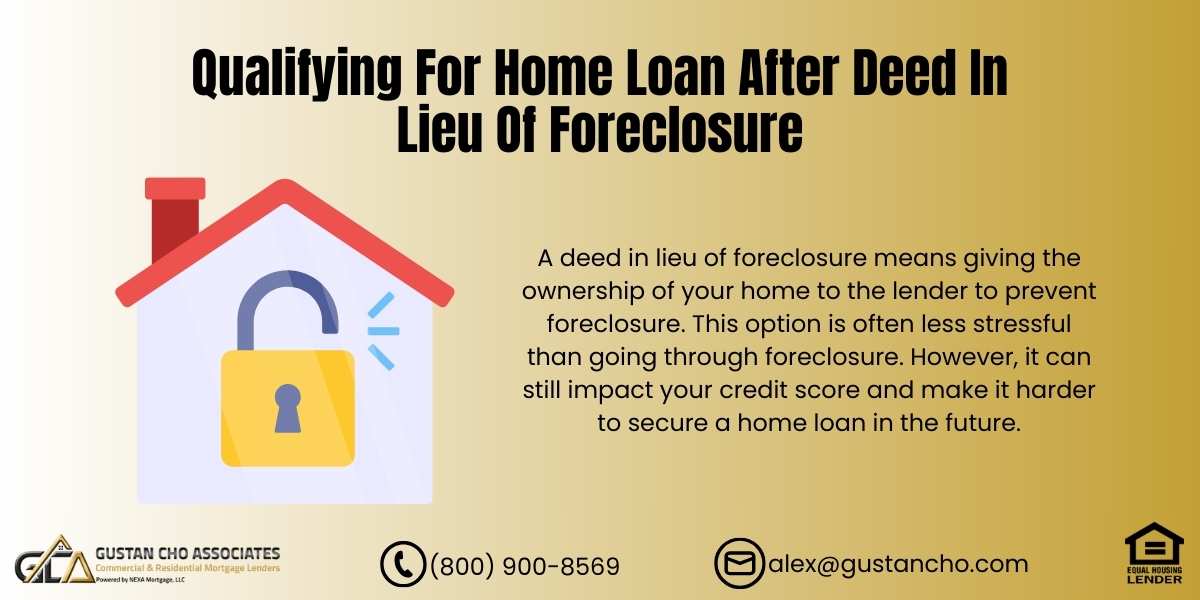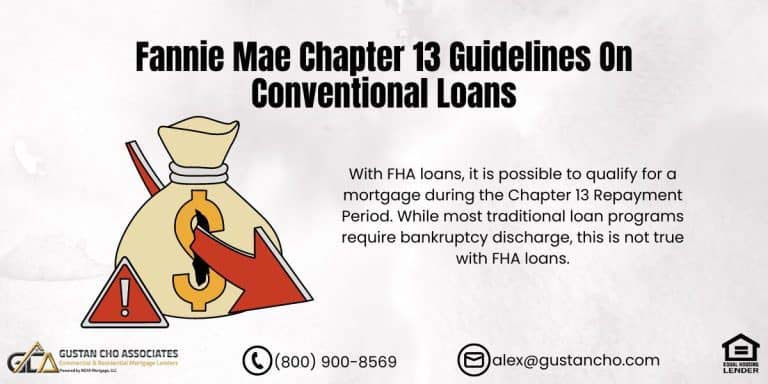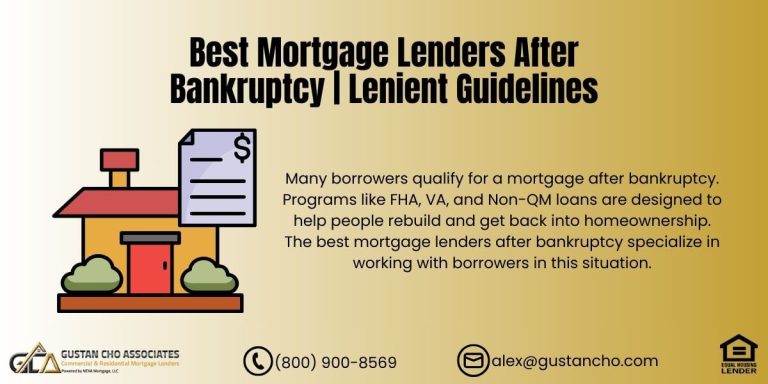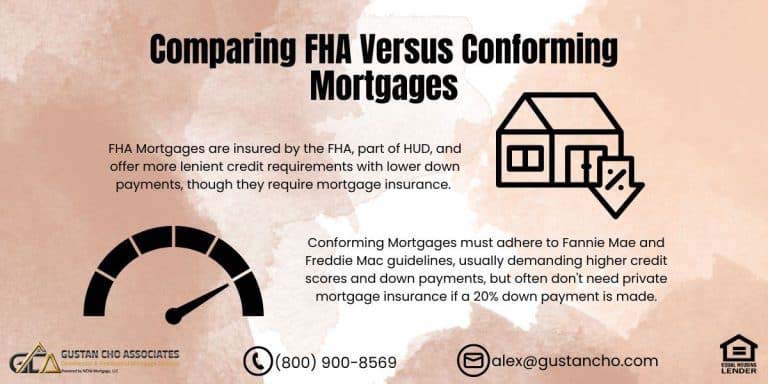Qualifying for a Home Loan After Deed in Lieu of Foreclosure in 2024
Life happens. Financial struggles can force homeowners to make tough decisions, and sometimes, a deed in lieu of foreclosure feels like the best way out. But here’s the good news: your dream of homeownership doesn’t have to end there. At Gustan Cho Associates, we help borrowers like you navigate the path to homeownership—even after financial setbacks.
This article includes everything you need to know about qualifying for a home loan after deed in lieu of foreclosure, including updated guidelines for 2024, tips to improve your chances, and loan options that could work for you.
Deed in Lieu of Foreclosure: What is it?
A deed in lieu of foreclosure is an option to prevent foreclosure by willingly handing over ownership of your house to your lender. While it protects you from the lengthy and stressful foreclosure process, it’s still considered a significant credit event. This may affect your chances of obtaining a home loan down the line, although the specifics regarding the timeline and available options differ based on the type of loan.
What is the Waiting Period for a Home Loan After Deed in Lieu of Foreclosure?
The waiting period depends on the type of loan you’re pursuing. Here’s an updated look at the required waiting periods for 2024:
FHA Loans
- Waiting Period: 3 years from the recorded date of the deed in lieu of foreclosure.
- Additional Requirements: A credit score of at least 580 (though higher scores may qualify for better terms), a steady employment history, and re-established credit.
VA Loans
- Waiting Period: 2 years from the recorded date.
- Additional Requirements: This option is for eligible veterans, active-duty service members, and their families. Lenders will look for a strong credit profile and residual income.
USDA Loans
- Waiting Period: 3 years from the recorded date.
- Additional Requirements: USDA loans are available for homes in eligible rural areas and require proof of stable income and good repayment history.
Conventional Loans (Fannie Mae/Freddie Mac)
- Waiting Period: 4 years from the recorded date of the deed in lieu of foreclosure.
- Additional Requirements: Borrowers need a minimum 620 credit score, a 5% down payment, and documented financial stability. If the deed in lieu was part of a Chapter 7 bankruptcy, the waiting period starts from the bankruptcy discharge date, not the transfer date.
Non-QM Loans
- Waiting Period: None!
- Why It Works: Non-QM loans (non-qualified mortgages) are designed for borrowers who don’t meet traditional lending guidelines. These loans necessitate a higher down payment (generally between 10% and 20%) and feature more adaptable underwriting standards.
Take First Step Toward Making Your Dream A Reality
Apply Online And Get recommendations From Loan Experts
Why Timing Matters: The Importance of the Recorded Date
One common misunderstanding is when the waiting period starts. Many borrowers think the clock begins ticking as soon as they sign over the deed and turn in their keys. Unfortunately, this isn’t the case. The waiting period starts only when the deed is officially transferred from your name and recorded by your county.
Here’s why this matters:
Lenders aren’t always in a rush to record the transfer. This can leave your name on the deed for months—or even years—delaying your ability to start the waiting period. If unsure whether the deed has been recorded, check with your county’s Recorder of Deeds office.
Deed in Lieu as Part of Bankruptcy: A Special Case
If your deed in lieu of foreclosure was part of a Chapter 7 bankruptcy, there is some positive news for you. Conventional loan guidelines allow you to qualify for a mortgage 4 years from the bankruptcy discharge date, regardless of when the deed transfer was finalized.
Example: Let’s say your Chapter 7 bankruptcy was discharged in January 2020, but the deed in lieu transfer wasn’t recorded until January 2022. Under conventional loan guidelines, you could qualify as early as January 2024 because the waiting period is based on the bankruptcy discharge date.
Steps to Expedite Your Waiting Period
If the transfer of the deed is hindering your eligibility, you can take actions to expedite the process.
- Communicate with Your Lender: Reach out to your lender to confirm the status of the deed transfer. If it hasn’t been recorded, ask them to prioritize the process.
- Sell the Property: If the lender is dragging its feet and you technically own the home with no mortgage lien, listing the property for sale can often prompt action. Once the lender sees you’re serious about selling, they may expedite the transfer to prevent complications.
- Seek Legal Advice: If your lender isn’t on board, don’t worry! Talking to a real estate attorney can help. They can clarify your rights and explore your options.
Loan Options Without a Waiting Period
Non-QM loans offer a lifeline for those who can’t or don’t want to wait. These loans are tailored for borrowers facing special financial circumstances, such as recent credit events like a deed in lieu of foreclosure. It’s important to understand that options exist for everyone, and help is available to navigate these situations.
Why Choose a Non-QM Loan?
- No waiting period.
- Flexible income verification (e.g., bank statements, profit and loss statements).
- Available for primary residences, second homes, and investment properties.
What’s the Catch?
Non-QM loans typically require:
- A larger down payment (10%–20%).
- Higher interest rates than traditional loans.
- Proof of financial stability (e.g., savings, steady income).
How to Rebuild Your Credit After a Deed in Lieu of Foreclosure
Improving your credit profile is key to qualifying for a home loan after a deed in lieu of foreclosure. Here are actionable tips:
- Review Your Credit Report: Ensure the deed in lieu is accurately reported. Dispute any errors with the credit bureaus.
- Pay Bills on Time: Your payment history accounts for a significant 35% of your credit score. Can setting up autopay help? Absolutely! It can be a fantastic way to prevent missed payments and keep your score in good shape.
- Reduce Debt: Lowering your credit utilization ratio can greatly impact your credit score. Aim to keep your balances under 30% of your overall credit limit for optimal outcomes. This simple step makes a difference!
- Add Positive Credit Accounts: Secured credit cards and credit-builder loans are helpful tools for building a strong credit history. They offer a clear path to improving your credit score, which is super important for future financial opportunities.
- Avoid New Credit Applications: Applying for credit too often can impact your score, so it’s best to limit those hard inquiries. When should you apply for credit? Only do so when it’s truly necessary. This way, you’ll keep your credit in good shape and improve your chances of securing loans in the future.
Start Your Process Towards Buying A Home
Apply Online And Get recommendations From Loan Experts
Why Choose Gustan Cho Associates?
At Gustan Cho Associates, we specialize in helping borrowers with past credit challenges. Whether you’re recovering from a deed in lieu of foreclosure or looking into Non-QM loans, we have the knowledge and a variety of loan programs to support you. Your goals matter to us!
What Sets Us Apart:
- No lender overlays: We follow agency guidelines to the letter, so you won’t face additional hurdles.
- Non-QM loan expertise: We’ll find creative solutions if traditional loans aren’t an option.
- Personalized guidance: We invest time in understanding your individual circumstances and objectives.
The Bottom Line: Your Path to Homeownership
A deed in lieu of foreclosure is a setback—but it’s not the end of your homeownership journey. With the right guidance and loan program, you can qualify for a home loan after deed in lieu of foreclosure and start fresh. At Gustan Cho Associates, we’re here to help you every step of the way.
Ready to take the next step? Contact us today at 800-900-8569 or alex@gustancho.com to explore your options and find the best loan program for your situation. We are available 7 days a week, on weekends, even on holidays. Homeownership is closer than you think!
Frequently Asked Questions About Home Loan After Deed in Lieu of Foreclosure:
Q: What is a Deed in Lieu of Foreclosure?
A: A deed in lieu of foreclosure means giving the ownership of your home to the lender to prevent foreclosure. This option is often less stressful than going through foreclosure. However, it can still impact your credit score and make it harder to secure a home loan in the future.
Q: How Long do I Have to Wait to Get a Home Loan After Deed in Lieu of Foreclosure?
A: The waiting period depends on the loan type:
- FHA: 3 years
- VA: 2 years
- USDA: 3 years
- Conventional: 4 years (or sooner if included in Chapter 7 bankruptcy)
- Non-QM loans: No waiting period
Q: Can I Qualify for a Home Loan After Deed in Lieu of Foreclosure with Bad Credit?
A: Yes, but it depends on the type of loan. Non-QM loans offer excellent opportunities for those with lower credit scores. Additionally, FHA loans are beneficial for borrowers who have a score of 580 or above. These options help you secure financing when traditional loans are not available.
Q: What is a Non-QM Loan, and How Can it Help Me?
A: A Non-QM (non-qualified mortgage) loan is a flexible option for borrowers who don’t meet traditional loan guidelines. There’s no waiting period after a deed in lieu of foreclosure, but you’ll need a larger down payment (10%-20%) and proof of financial stability.
Q: When Does the Waiting Period Start After a Deed in Lieu of Foreclosure?
A: The waiting period starts when the deed is officially transferred from your name and recorded with your county. This can take months or years, so it’s important to confirm that the transfer has been completed.
Q: Can I Get a Home Loan After Deed in Lieu of Foreclosure if it was Included in My Bankruptcy?
A: Yes! If you completed a Chapter 7 bankruptcy and used a deed in lieu, the waiting period for a conventional loan begins from the date your bankruptcy was discharged, not from when you made the transfer. This means there’s a clear path forward for you to secure financing after overcoming these challenges.
Q: How Can I Rebuild My Credit After a Deed in Lieu of Foreclosure?
A: You can follow these tips to rebuild your credit:
- Pay bills on time.
- It’s important to keep your credit card balances low, ideally below 30% of your credit limit.
- Dispute any errors on your credit report.
- Consider using secured credit cards or credit-builder loans to establish positive credit accounts. These options can help improve your credit history effectively.
Q: What Happens if My Lender Hasn’t Transferred the Deed from My Name?
A: Your waiting period won’t start until the deed is officially transferred. You can:
- Ask the lender to expedite the transfer.
- Consider selling the property to prompt action.
- Consult a real estate attorney if the lender is unresponsive.
Q: Is it Possible to Buy a Home Right After a Deed in Lieu of Foreclosure?
A: Yes, with a non-QM loan. These loans don’t have waiting periods, but you’ll need a larger down payment and higher interest rates than traditional loans.
Q: Why Should I Work with Gustan Cho Associates for My Home Loan After Deed in Lieu of Foreclosure?
A: We specialize in helping borrowers with credit challenges. Whether you’re looking for an FHA loan, a Non-QM loan, or guidance on rebuilding your credit, we have the expertise and programs to help you achieve homeownership.
Related> Mortgage After Deed In Lieu Versus Foreclosure
Related> Mortgage After Deed In Lieu In California
Related> Conventional Loan After Deed In Lieu Of Foreclosure
This blog about “Qualifying For Home Loan After Deed In Lieu Of Foreclosure” was updated on December 6th, 2024.









